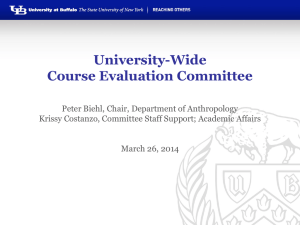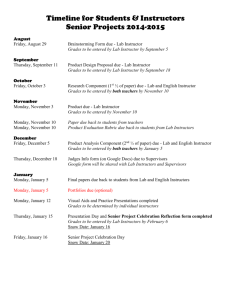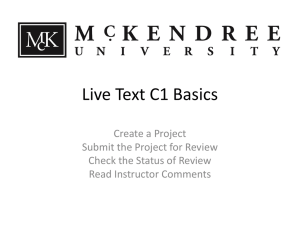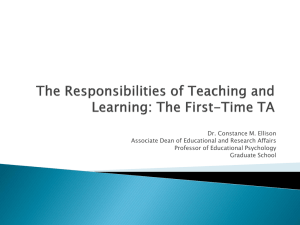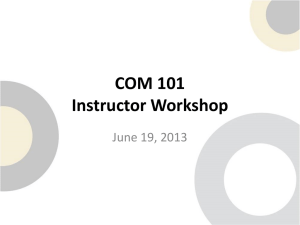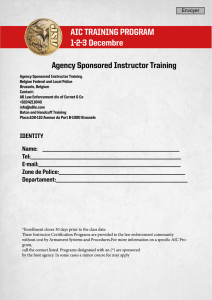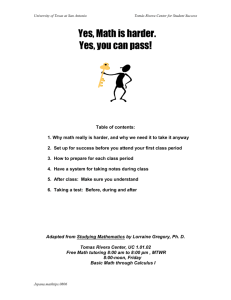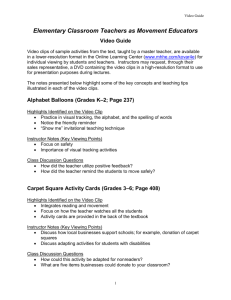Raise Your Grades Through Classroom Interaction
advertisement
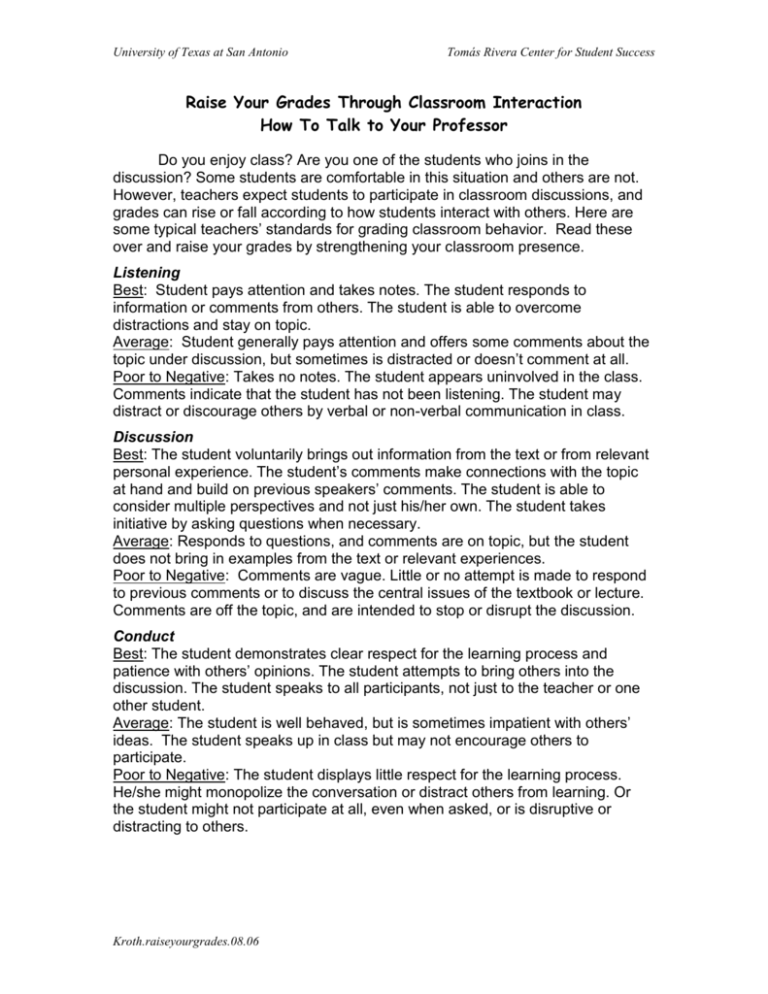
University of Texas at San Antonio Tomás Rivera Center for Student Success Raise Your Grades Through Classroom Interaction How To Talk to Your Professor Do you enjoy class? Are you one of the students who joins in the discussion? Some students are comfortable in this situation and others are not. However, teachers expect students to participate in classroom discussions, and grades can rise or fall according to how students interact with others. Here are some typical teachers’ standards for grading classroom behavior. Read these over and raise your grades by strengthening your classroom presence. Listening Best: Student pays attention and takes notes. The student responds to information or comments from others. The student is able to overcome distractions and stay on topic. Average: Student generally pays attention and offers some comments about the topic under discussion, but sometimes is distracted or doesn’t comment at all. Poor to Negative: Takes no notes. The student appears uninvolved in the class. Comments indicate that the student has not been listening. The student may distract or discourage others by verbal or non-verbal communication in class. Discussion Best: The student voluntarily brings out information from the text or from relevant personal experience. The student’s comments make connections with the topic at hand and build on previous speakers’ comments. The student is able to consider multiple perspectives and not just his/her own. The student takes initiative by asking questions when necessary. Average: Responds to questions, and comments are on topic, but the student does not bring in examples from the text or relevant experiences. Poor to Negative: Comments are vague. Little or no attempt is made to respond to previous comments or to discuss the central issues of the textbook or lecture. Comments are off the topic, and are intended to stop or disrupt the discussion. Conduct Best: The student demonstrates clear respect for the learning process and patience with others’ opinions. The student attempts to bring others into the discussion. The student speaks to all participants, not just to the teacher or one other student. Average: The student is well behaved, but is sometimes impatient with others’ ideas. The student speaks up in class but may not encourage others to participate. Poor to Negative: The student displays little respect for the learning process. He/she might monopolize the conversation or distract others from learning. Or the student might not participate at all, even when asked, or is disruptive or distracting to others. Kroth.raiseyourgrades.08.06 University of Texas at San Antonio Tomás Rivera Center for Student Success How To Have An Enjoyable Talk With Your Professor Students constantly hear the advice, “Make sure that you get to know your instructor.” How do you do that? Some instructors seem like unapproachable, important, busy, brainy people who are too scary to approach. Even if you’re brave enough to actually go into your professor’s office during the scheduled office hours, what do you say? It’s true that some instructors are not as easy to talk to as others, but if you follow some simple guidelines, you’re likely to have an enjoyable, helpful talk with your teacher. 1. Visit during office hours or schedule an appointment. If you try to just “drop in,” or to follow your instructor down the hall after class, your teacher may not be able to give you much attention. It isn’t that he or she doesn’t want to talk to you, but that other responsibilities might be pressing at that time. Ask for a time to meet. 2. Visit your instructor when you have a legitimate issue to discuss. What is a “legitimate” issue? Here are a few examples: a. You honestly cannot understand why you performed poorly on a test, paper, or other assignment. (If you know that the reason for your poor performance is lack of preparation, don’t waste your own time or your instructor’s by asking what you can improve—start studying smarter today!) Do not expect extra points as a result of your visit. Better grades should be a result of your improved performance, not your instructor’s friendliness. b. You are considering pursuing a major in your instructor’s area of interest and would like more information. c. You are having a hard time understanding a certain problem or concept, and you would like to get some extra help. Make sure that you have an example of the item that you need help with. 3. Prepare before going to see your instructor. a. Plan your questions ahead of time. Write them down so that you are sure to cover all your concerns. Your teacher can’t help you with questions you forget to ask. b. If you’re going to see your instructor about grades, take all your graded material with you, along with your lecture notes and other study aids. Looking over these materials can help your instructor pinpoint what you could do differently or what you may be missing. c. If you’re considering a major or graduate school in your instructor’s area of expertise, here are some questions to consider asking during your visit: 1. What first interested you about this subject? 2. What in this field especially interests you now? Kroth.raiseyourgrades.08.06 University of Texas at San Antonio Tomás Rivera Center for Student Success 3. Other than teaching at the university level, what other career opportunities exist that relate to this major? 4. Are there any internships offered for this major? 5. Are there opportunities for study or research within this department? 6. What should I do to prepare for graduate school? 4. Have an open, friendly attitude when you visit your instructor. This is easy to do if you like the professor and are doing well in the course, but it can be difficult if aren’t performing as well as you feel you should. Keep in mind that your teacher is fascinated by the subject that he or she is teaching, and try to look at the subject from that perspective. Respect your professor for his/her expertise, if nothing else. Being defensive is the quickest way to turn off your instructor’s desire to help, so be open to suggestions and make an effort to listen. Many instructors are unaware that their students feel uncomfortable approaching them. Come into the visit with an open, friendly attitude and a specific set of questions, and most professors will be happy to give you information and help you work through problems. The friendships you form with your instructors are keys to enjoying college more and feeling better about learning. Invest the time that it takes to get to know your teachers and your effort will pay off. Kroth.raiseyourgrades.08.06
